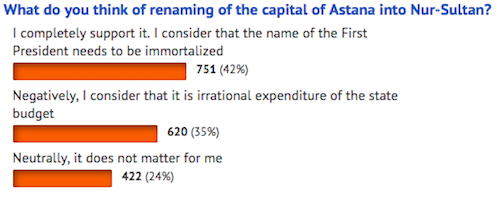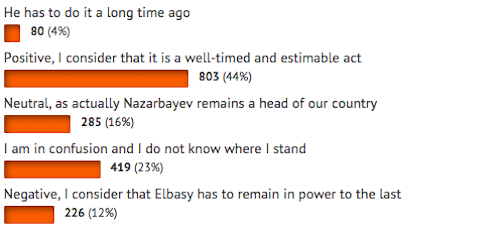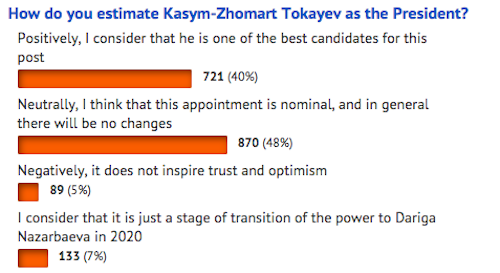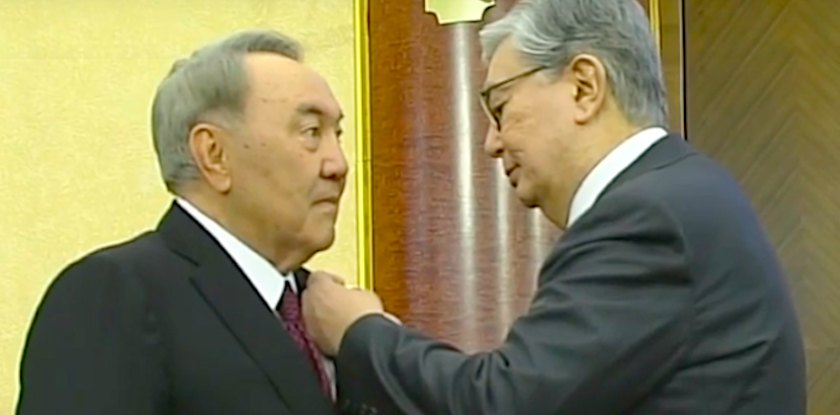One of the positive, in our opinion, outcomes of the events that took place on March 19-20, 2019, when the First President and the Leader of the Nation of the Republic of Kazakhstan Nursultan Nazarbayev suddenly announced his resignation from the presidential post and surrendered his powers to the Speaker of the Senate is the noticeable reinvigoration of the internal political process in the country.
Note that manifests itself not only in the form of the personnel reshuffles within the state apparatus that have recently become much more frequent and of the few protestations against the renaming of the capital but also via the shaking up of the people obligated to or forced to publicly react to what is going on in the country. As a result, the Kazakh information space is now overflown with the stories of all types of focus, quality, emotionality and persuasiveness which, in itself, is good news given the prolonged political and social stagnation in the country.
Besides, such an important news as the nominal ending of Nazarbayev’s political domination forces many people to assess, one way or the other, the results of the three decades of his rule and think about the future, their own and that of Kazakhstan. How long this activity will last and whether it will bring a positive result is another question.
Although one result has already been achieved – now we can see the positions advocated by certain civic leaders with clarity. We are not going to analyze the situation in this sphere; our only remark is that the saying “a bird may be known by its song” has fully proven its worth.
The same can be said about the Kazakh media-resources. Moreover, the necessity to find a standing amid the forming of the two centers of governance (influence) in the authoritarian political system and the super-presidential vertical has resulted in the fact that the pro-government media struggle to decide which god to worship first, and this is becoming very apparent.
The fact that the volume of sycophancy towards the people in power is growing since it is now necessary to “clock in” and “butter up” not just the First President of the Republic of Kazakhstan but also the second who is the acting head of the state is an unintentional result of the society’s fluctuating together with Akorda’s policy.
To confirm our ideas, we will cite the publication on Zakon.kz titled “Tokayev is one of the best presidential candidates – survey”. The lead of the publication reads as follows: “The results of the surveys show the positive attitude of the citizens to the Leader of the Nation”. One must agree that, in this case, the “dual personality” manifests itself clearly but the skillful work of the editor helps to make it “pretty”. The only thing the editor may be reproached for is that the Leader of the Nation is mentioned in the lead and Tokayev is mentioned in the headline.
On the other hand, it is not so much the headline that we find interesting as the content itself. It tells about the results of the survey of the Kazakh citizens conducted by Demoscope Bureau for Express Monitoring of Public Opinion existing under the International Center for Journalism MediaNet. We are going to take the liberty to interpret it differently from the way it was done in the aforementioned publication.
First, the renaming of the capital from Astana into Nur-Sultan for the purpose of immortalizing the name of the First President of the Republic of Kazakhstan Nursultan Nazarbayev is supported only by 42% of the respondents whereas the share of those opposed and undecided constitutes 58%.
 Second, when assessing Nursultan Nazarbayev’s sudden resignation from the presidential post, only 12% stated that the Leader of the Nation should have stayed in power till the last breath whereas 88% supported his decision one way or another.
Second, when assessing Nursultan Nazarbayev’s sudden resignation from the presidential post, only 12% stated that the Leader of the Nation should have stayed in power till the last breath whereas 88% supported his decision one way or another.
How do you assess Nursultan Nazarbayev's sudden resignation from the presidential post?
 With that, 4% of the respondents who said that this should have been done a long time ago may be regarded as the “opposition” while 39% of the respondents who hold a neutral position and are undecided may be regarded as indifferent. In general, 56% at best support the former head of the state today.
With that, 4% of the respondents who said that this should have been done a long time ago may be regarded as the “opposition” while 39% of the respondents who hold a neutral position and are undecided may be regarded as indifferent. In general, 56% at best support the former head of the state today.
Third, when assessing Nursultan Nazarbayev’s presidential achievements, only 11% responded neutrally and 2% - negatively while 87% gave a positive response. So, when answering this question, the share of the “oppositionists” decreased twice in comparison to the answer to the second question while the share of the neutral and undecided respondents turned out to be almost four times lower.
How do you assess Nursultan Nazarbayev's performance as the President of Kazakhstan?

Fourth, when assessing KasymZhomart Tokayev as the President of the Republic of Kazakhstan, only 40% responded positively and said he was one of the best presidential candidates while 60% responded negatively or said he was a transit figure.

The given data show that the share of the “oppositionists” in the country constitutes no more than 2-4%, of those supporting Akorda constitutes about 40-56%, and the rest is simply the undecided, the indifferent and the apathetic. And even though 87% responded positively to the Leader of the Nation’s presidential achievements, almost the same percentage (88%) supported Nazarbayev’s resignation.
So, this is a clear example of that very duality that, in our opinion, results from the centuries-old struggle of the nomadic people to survive in the harsh conditions when the social capital is worth much less than the cattle and other possessions. As a result, the habit of thinking one thing and saying another has become the standard line of behavior in everyday life, business, public life and politics.




